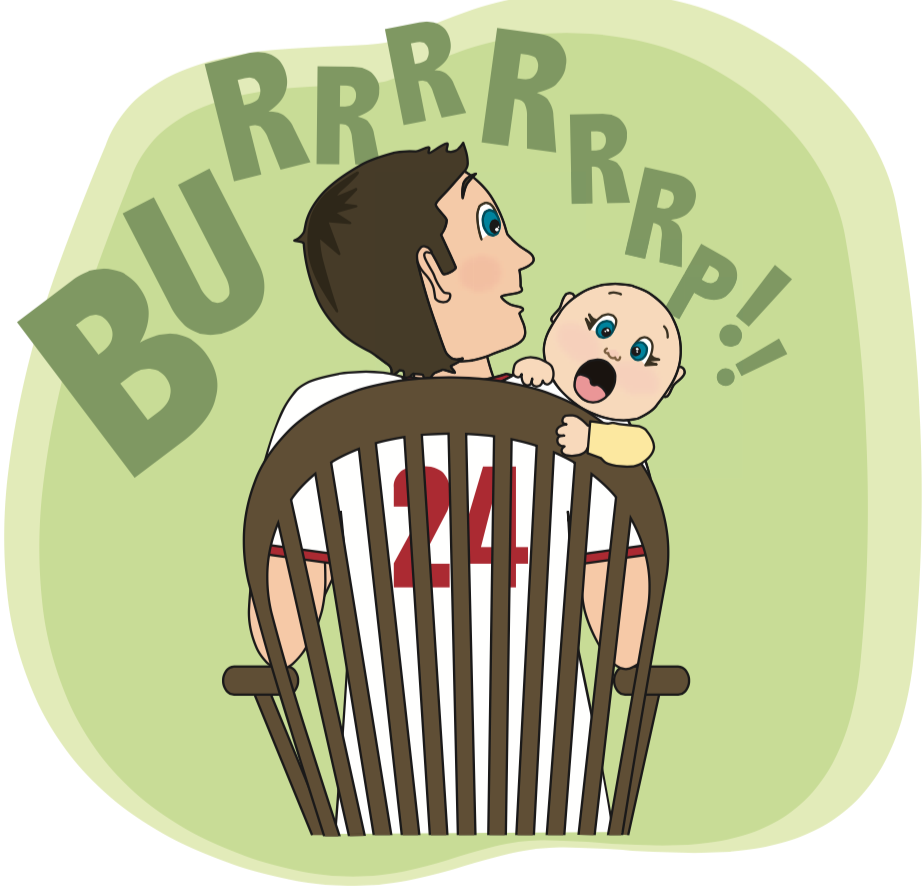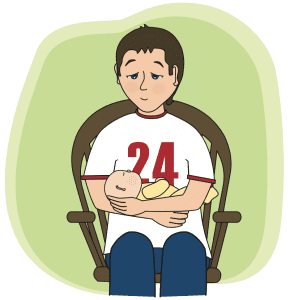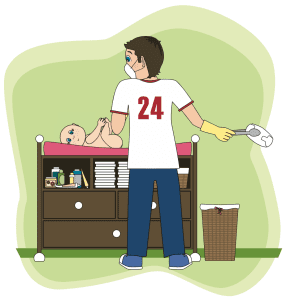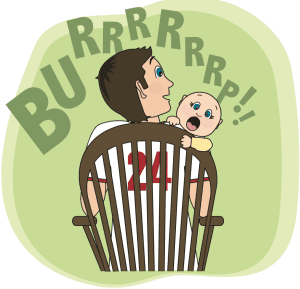
Father’s Daze – A new dad’s guide to baby care
New dads have an image problem. We’re often seen as clueless and inept, with all the natural parenting ability of a canned ham. This is not our fault, at least partly. Unlike women, we were not born knowing what a “layette” is or that yoo-hoo is not an acceptable infant formula. This is why new dads must take some responsibility for this handicap and make an effort to learn what it takes to gear up for daddyhood.
Still, you can only prepare for so much. When my wife and I were expecting our first child, I had never diapered a baby before, so I practiced putting disposables on my wife’s ancient but accommodating childhood Winnie the Pooh. When I stepped up to diaper my newborn daughter for the first time, I was nervous, but I thought I at least had it pretty well under control. I lifted my girl’s tiny legs, slid the diaper under her adorable little bottom—and the meconium (newborn stools) started coming out. And coming out. And coming out some more.
I wasn’t prepared for this shiny black ooze coming from my precious daughter, especially not this much of it. My supplies on hand were quickly soiled as I tried to keep up with the flow. “More diapers! More wipes!” I called, although my wife says my call was more like a terrified squawk. I am now willing to admit that I may have overreacted a bit, but to hear others tell it, you could have mistaken me for Jack Bauer on 24, frantically trying to rescue the planet from evil terrorist baby poop.

I never expected that my helpless sweetheart could throw me into such a panic. Being a new father is like that: It will take you further out of your comfort zone than you’ve ever been and in ways that you could never anticipate. But once you start to figure out your little one and the anxiety subsides, you won’t remember what life was like before you became a dad. (Although there will be days you’ll give anything to remember. Anything.) Here are eight hard-won pointers to help you proudly, fearlessly, and clue-fully wear the mantle of New Dad.
1. Holding a newborn
If you’ve had no experience with babies, holding your newborn for the first time can be awkward. You keep holding the baby in the exact same position she was in when you first picked her up, because hey, even though your hands and arms are cramping up something fierce, you haven’t maimed the baby by holding her like that, so keep doing it, right?
Relax. As long as your baby’s head is supported while you’re holding her, she’ll be fine. With the head supported, you can try holding her in different positions to see what you both like: resting on your shoulder, cradled in your arms, sitting up in your lap with your propped- up legs behind her. Your baby will speak up if she doesn’t like how you’re doing things. She’s like her mom in this regard.
 2. Changing Baby’s Diaper
2. Changing Baby’s Diaper
You’ll know it’s time to change baby’s diaper when it looks puffy and feels squishy, or when its contents start creeping up baby’s back or pooling at your feet.
Before starting, get your supplies in place: clean diapers, wipes, tissues and diaper cream, and a change of clothes for baby, just in case. Lay baby down on his back, keeping a hand on him as you work. Open a clean diaper and slide it under baby’s bottom—picture side goes in front, tape side goes in back. Undo the current diaper but leave it in place to catch any stray nastiness as you clean. Use wipes to clean (then dry with tissues) baby’s bottom and boy/girl bits. For girls, always wipe front to back. For boys, always wipe under the twig and berries.
Just drop soiled wipes and tissues right on top of the soiled diaper. Roll up, seal, and toss the diaper. Apply any necessary diaper cream, then pull up the clean diaper’s front and tape each side snugly. Admire your work for the few moments before the new diaper’s contents creep up baby’s back or pool at your feet.
3. Bathing your newborn
Your newborn only needs to be bathed once or twice a week. And until your baby’s umbilical stump falls off (usually after two weeks), you’ll be sponge-bathing her. To do this, get a washcloth, a couple of towels, and a bowl of warm water. Turn up the thermostat and close any drafty doors and windows. Undress baby and lay her on a towel or absorbent cloth. Keeping a hand on baby at all times, dampen the washcloth and run it over her body, wiping under her chin and in the folds of her skin that trap moisture. Dry her off gently but thoroughly.
A word of warning: Sponge baths can cause your baby to squirm and fuss, weakening her already tenuous grasp on the solids, liquids, and gases in her body. You would do well to have an extra towel or two handy, if not a full suit of raingear.
4. Burping Your newborn
 A side effect of feeding your baby is that he is going to swallow a lot of air, mak- ing him uncomfortable. And he’s going to need your help getting that air out as he burps (which you may already know a little something about).
A side effect of feeding your baby is that he is going to swallow a lot of air, mak- ing him uncomfortable. And he’s going to need your help getting that air out as he burps (which you may already know a little something about).
I find the best way to burp a newborn is to sit him up in your lap, facing the side. Support his chest with the palm of your hand, and hold up his chin between your thumb and forefinger. With your other hand, pat him gently but persistently on the back (no wallops) until the burps come out. Sometimes they will be cute little urps; sometimes they will be window-rattling blaaarrrps that startle passersby. It is also very likely that baby will spit up, so have a burp cloth handy. Either way, his burps will make you feel inordinately proud. Changing diapers is a chore, but making your baby burp — that’s an accomplishment.
5. Soothing Your Crying Newborn
For your newborn, life on the outside can be tough going at times, and she’ll cry to let you know that she needs comforting.
First, you should check if your baby is hungry, wet, or otherwise uncomfortable. If none of these apply and your baby still cries, lift her up against your shoulder, supporting her head with one hand. Gently sway from side to side and talk to her softly with the same warm, reassuring gibberish you previously reserved for scratching your dog’s tummy, such as “There’s a foogy-woogy wittle num-num noogy.” Don’t try to memorize this phrase; just say what comes naturally. These are your parenting instincts at work.
6. Taking Baby’s temperature
If you think your baby might be sick, it’s a good idea to take his temperature. Unfortunately, the most accurate way to do this is with a rectal thermometer. Because this method is invasive and can be uncomfortable for the child, I recommend this technique for taking your baby’s rectal temperature: Get mom to do it.
If this isn’t possible, take a rectal thermometer and dab a little petroleum jelly on the tip. Undress baby below the waist and lay him tummy-side down in his crib. Keep one of your hands on his lower back and insert the thermometer one- half to one inch into his rectum. After two minutes, withdraw the thermometer and read. If it’s over 100.4 degrees Fahrenheit (38 degrees Celsius), call your pediatrician. If it’s OK, wipe your brow and tell your wife it’s her turn next time.
7. Entertaining Your Baby
Bonding with your newborn is the time for getting in touch with your inner goof- ball. Your baby spends her waking hours learning about the world around her, and one way she learns is through play. So spend these times interacting play- fully with your baby: Read to her, sing her songs in a soft voice, dance her gently around the room, hold a toy for her to focus on, talk to her in funny voices, make silly faces—and have fun while doing it. The livelier and sillier you are, the more you will stimulate your baby’s thought processes, such as, “What a weirdo. Where’s the one with the milk?”
8. Putting Baby to bed
If you’re one of the lucky ones, your baby will want to sleep from time to time. When you put him to bed, make sure his clothing fits snugly and that the sheet fits tightly across the crib mattress. Keep toys and stuffed animals out of the crib. And always, always put baby to sleep on his back, no matter what his grandma says.
Swaddling your baby before bed helps him feel calm and secure, and that helps him sleep. Unfortunately, if the delivery nurse didn’t teach you how to swaddle, you’re probably a lost cause. I could tell you, but it would take too long, and being a visual creature, you won’t learn it from printed words anyway. You probably aren’t even reading this anymore. Your wife is probably the only one reading it, looking for some insight into the way new dads think…and she’s getting very depressed.
You’ll be fine!
Now go forth, new dad, and set about raising your little one. You’ll never do anything as exhausting or humbling, but you’ll never do anything as important, either. And as your confidence grows, and you and your baby fall into a com- fortable rhythm, sharing all the setbacks and triumphs of growing together as only a daddy and his baby can, you’re very likely to hear these six little words: “I want to have another baby.”
Gary Thorn, a freelance writer living in Chapel Hill, NC, wrote this when he had a two-year-old daughter and an 11-month-old son. He spends his free time trying to appease the potty-training gods.


Absolutely! Here are some great baby care tips for dads:
1. Bonding Time: Spend quality time with your baby to build a strong bond. This could be through cuddling, reading, or singing to them.
2. Diaper Duty: Don’t shy away from changing diapers. It’s a great way to be hands-on and help out.
3. Feeding Support: If your partner is breastfeeding, you can still be involved by helping with burping, holding, or even preparing bottles if you’re using formula.
4. Playtime: Engage in interactive play with your baby. This helps in their development and is fun for both of you.
5. Safety First: Always ensure your baby’s safety, whether it’s in the car, at home, or during playtime.
6. Learn from Mom: Your partner can be a great source of knowledge and support. Learn from her experiences and share your own.
7. Self-Care: Taking care of yourself is essential too. Get enough rest, eat well, and don’t hesitate to ask for help when you need it.
8. Be Present: Be present and involved in your baby’s life. The time goes by quickly, so cherish every moment.
9. Patience: Babies can be demanding, but patience is key. Take a deep breath when things get overwhelming.
10. Enjoy the Journey: Parenthood is a beautiful journey. Embrace the ups and downs, and enjoy watching your baby grow and develop.